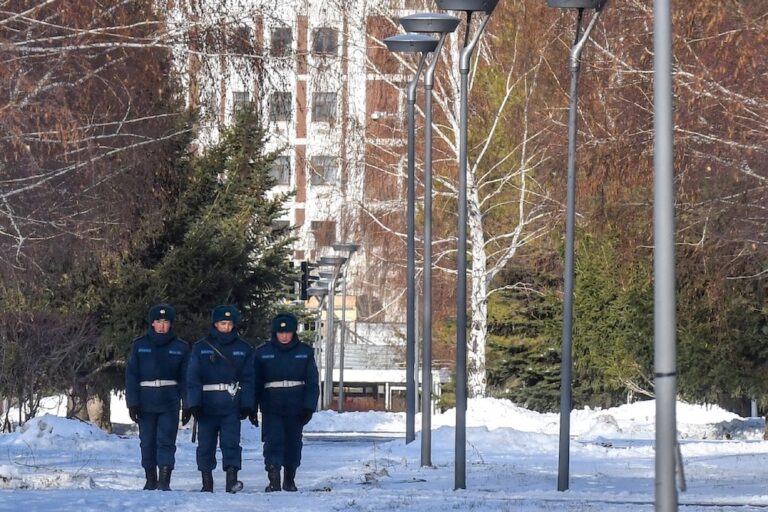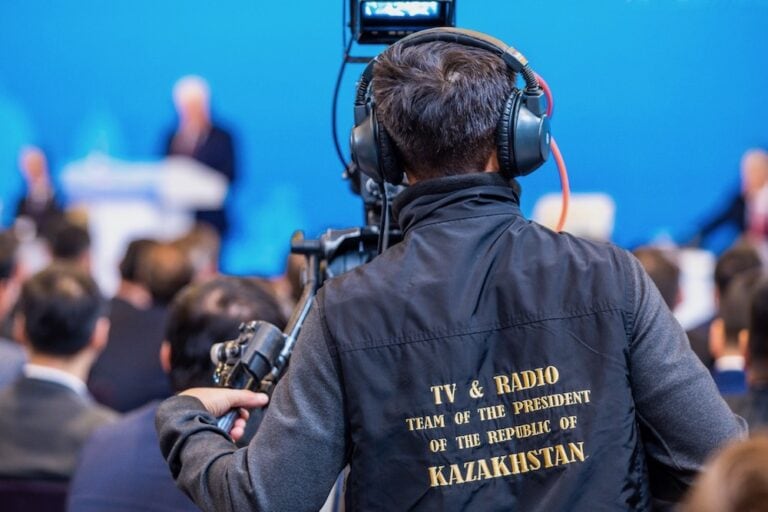The courts convicted three dozen workers of organizing mass unrest for participating in a seven-month strike for better labour conditions in the town of Zhanaozen.
(Human Rights Watch/IFEX) – Berlin, June 5, 2012 – A Kazakhstan court, on June 4, 2012, convicted 34 oil workers and others on charges relating to violent clashes with police in December 2011, despite the use of testimony obtained by torture and ill-treatment, Human Rights Watch said today. The authorities should drop all unfounded charges and thoroughly and impartially investigate the defendants’ allegations of torture and other ill-treatment, Human Rights Watch said.
In a trial that began on March 27, the Aktau City Court found 34 of 37 oil workers and others guilty of various crimes including “organizing and participating in mass unrest” and theft during the clashes in western Kazakhstan. The court appeared to punish most heavily oil workers who were most active during a 2011 strike, Human Rights Watch said.
“For the court to reach a verdict without properly investigating the defendants’ serious claims of torture is sham justice,” said Jane Buchanan, acting deputy Europe and Central Asia director at Human Rights Watch. “This verdict and the hefty prison sentences for the most outspoken oil workers only reinforce the concern that they were singled out for their peaceful strike activities.”
Three oil workers, among the 13 defendants who were sentenced to prison, had actively participated in a peaceful seven-month strike in Zhanaozen and had spoken to international media and organizations about the strike before it ended with the outbreak of violence in mid-December. Rosa Tuletaeva, Maksat Dosmagambetov, and Talgat Saktaganov were sentenced to seven, six, and four years, respectively.
Trial monitors reported that, during the trial, many defendants testified that they had suffered beatings, suffocation, psychological pressure, and other ill-treatment, apparently to coerce testimony against themselves or others. The coerced testimony of at least one defendant was used against other defendants, including those sentenced to prison. Defendants testified that the abusive treatment was carried out by police officers and investigators, agents of Kazakhstan’s National Security Committee (KNB), and, in at least one case, an officer from the Zhanaozen prosecutor’s office. The authorities did not effectively investigate these allegations, Human Rights Watch said.
The defendants sentenced to prison received sentences ranging from three to seven years. Of the twenty-one who were released, five were given amnesty and sixteen were given suspended sentences of one to three years. Three defendants were acquitted of all charges.
The trial related to crimes committed on December 16, 2011, in Zhanaozen, a town at the heart of Kazakhstan’s oil industry and the site of an extended oil workers’ strike.
In May 2011, oil workers went on strike at OzenMunaiGas, a subsidiary of Kazakhstan’s state oil and gas company KazMunaiGas. Over a dozen workers announced they were going on hunger strike to call for revision of the workers’ collective agreement, introduction of wage coefficients in their salaries, and changes to the system of remuneration that had been adopted the previous year. Workers told Human Rights Watch that thousands of other workers had joined the strike. Although the strike was found illegal by a local court, workers continued to demand higher pay. In July, workers relocated to Zhanaozen’s central square after police forcibly dispersed the strikers from OzenMunaiGas territory.
In December 2011, clashes erupted when unidentified men in oil company jackets charged a stage that had been set up for an event celebrating Kazakhstan’s Independence Day on Zhanaozen’s central square, where the strikers were gathered, and broke sound equipment. A video clip broadcast on various news programs shows the men destroying the equipment. Several buildings were set on fire and shops were looted over the course of the day.
The police, in response, opened fire on striking oil workers and others, killing 12 and wounding dozens, according to official numbers. Three other people died during the clashes and 35 police officers were injured, according to official statements by the prosecutor general’s office.
The prosecutor general’s office investigated the violence. Hundreds of people were detained and questioned. Human Rights Watch documented allegations of torture and ill-treatment by people who witnessed or were subjected to physical abuse by police in custody between December 16 and19. Defendants similarly testified at the trial that they had been tortured and mistreated after they were detained.
Five of the defendants – Shabdol Utkilov, Rosa Tuletaeva, Zhanat Murynbaev, Kairat Edilov, and Mels Sarybaev – told the court that during the investigation, officers or investigators attempted to coerce testimony by suffocating them with plastic bags.
Another defendant, Tanatar Kaliev, an oil worker charged with organizing mass riots, testified that during an interrogation, “[Officials] beat my head with a stool, [and] threatened there would be problems for my older son.” Kaliev’s testimony was used against Tuletaeva and Dosmagambetov, their attorney, Gulnara Juaspaeva, said in her closing statement.
Max Bokaev, a civil society activist who monitored the trial, said many of the defendants recanted all or part of the testimony they had given during the investigation, saying it had been coerced.
The Convention against Torture, to which Kazakhstan is a party, prohibits the use of statements and other evidence obtained through torture or ill-treatment in judicial proceedings.
The likelihood that convictions were based in part on evidence obtained through torture and other coercive methods, as well as the government’s unwillingness to investigate these allegations thoroughly, seriously call into question the basic fairness of the trial, Human Rights Watch said.
“Government claims of justice being served are ludicrous when the convictions were built on a foundation of torture and ill-treatment,” Buchanan said. “These verdicts make a mockery of Kazakhstan’s judicial system.”


